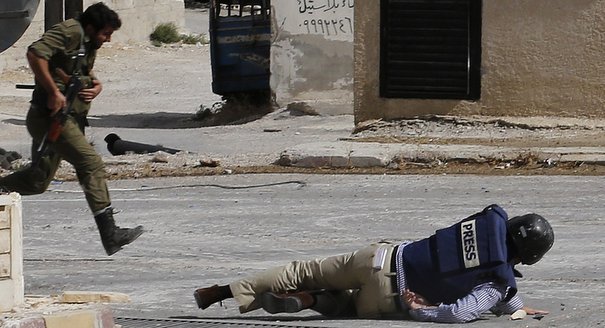Between a trigger-happy regime eager to censor dissident opinions and a chaotic insurgency that is increasingly intertwined with militant Islamism and criminality, reporting on Syria is no easy job. Few journalists venture into the combat zones anymore, and those who do face considerable risks.
The press freedom watchdog Reporters Without Borders (RSF) has named Syria the world’s most dangerous conflict to cover. According to recent RSF statistics, at least 25 professional correspondents have been killed since the start of the crisis, plus an additional 70 media activists and citizen journalists. At least sixteen foreign reporters are currently missing—presumably kidnapped or killed. (For those looking for more in-depth information on these tragedies, the RSF just released a 34-page report on the threats and obstacles that face journalists in Syria.)
One of the best-known correspondents covering Syria, who has traveled with rebels throughout the country and won widespread acclaim for her sensitive on-the-ground reporting, is the Lebanese Australian journalist Rania Abouzeid. She formerly worked with Time Magazine and is now contributing to the New Yorker and Al Jazeera America. To give us a sense of what it’s like to cover the Syrian conflict, she has kindly agreed to answer a few questions.
How long have you been reporting from Syria?
I was in Damascus in late February 2011 and witnessed the first rumblings in the capital. I used to cover other countries in the Middle East, but since early 2011 Syria has been my primary focus. I also reported from the country in the past, years before the uprising.
You’ve covered the wars in both Iraq and Syria. In what ways have these been different experiences?
I was pretty late to the Iraq war—I was busy with Lebanon in 2005, 2006, and 2007. I got to Iraq in 2008, when things were calmer but still dangerous in many parts of the country. Time Magazine had an established bureau there, and I worked with the staff. Obviously no such infrastructure exists in Syria for almost any Western media outlet except the wires, and that doesn’t really extend beyond Damascus. In Syria, I work alone.
Do you feel you’re generally welcomed as a foreign reporter, or is there a lot of suspicion to overcome?
There has always been a level of suspicion, not least because of my Lebanese-accented Arabic, given the varying degrees of Lebanese involvement in the Syrian conflict both for and against the regime. The accusation of “spy” still flies around easily in rebel circles. The regime, for its part, blacklisted me—also claiming I was a spy—a few months into the uprising.
There are other challenges: When I first started reporting this story, people were keen to speak. They wanted the world to know what was happening in Syria and feared that the international community didn’t have a clear picture. After a while, many became more reluctant. They often said things like, “why should we bother talking to you? What difference will it make?” At first, they said, they thought the world didn’t know. With time, they came to believe that it knew, it just didn’t care.
What are the greatest dangers you see for reporters in Syria?
First of all, it’s devolved into a very brutal, very ugly war, and you can simply be in the wrong place at the wrong time. We face the same dangers that Syrians face—the shelling, getting caught up in the fighting, criminality. A notepad and pen isn’t a magic shield against a warplane. There are also criminal elements kidnapping for ransom as well as rebel groups that do the same, either for money or ideological reasons.
Is there any story you’ve done in Syria that you are particularly proud of or happy that you did?
I consider it a privilege to cover Syria during this difficult, historic, painful period, and I am grateful for the opportunity to do so. Every story is a little piece of the puzzle, hopefully helping to flesh out what is happening in one of the most pivotal states in the Middle East.






